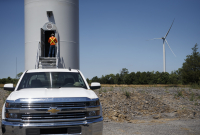Support strong Canadian climate journalism for 2025
Corporations in Canada have an “obligation” to disclose how the climate crisis will disrupt their long-term plans, according to a body formed by big-business leaders.
The Business Council of Canada, a lobby group representing chief executives of Canada's largest corporations, released a report Oct. 30 that contains this recommendation and others designed to juice the economy.
The report, called “A better future for Canadians,” says the country needs to develop a “national resource and climate strategy,” in part to meet intensifying demands for cleaner energy, and Canadian companies “have an obligation to demonstrate how they are incorporating the risks of a changing climate into their long-term business strategy."
“There’s increasing demands from shareholders, from regulatory authorities and so on,” John Dillon, senior vice-president for policy and corporate counsel at the Business Council of Canada, said in an interview with National Observer on the sidelines of the report’s unveiling in Ottawa.
“(Firms) have traditional risks in terms of securities, to disclose any material risks to their business,” he said. “At the same time, (climate-related risk) is a growing field of endeavor and study, without necessarily having clear guidelines on how exactly one assesses the risks that a changing climate may create to a business.”
A task force formed by the chief executives' group wrote the report, which also recommends that the government “prioritize” infrastructure projects like oil and gas pipelines. “All Canadians have paid the price for inadequate pipeline infrastructure, which seriously constrains energy exports,” the report says.
And it suggests, without providing specific evidence, that Canada can "help communities around the world cut their emissions" by exporting liquefied natural gas, a fossil fuel, to replace coal-fired power plants abroad.

Climate risks different from typical disclosure
Carbon pollution emitted by burning fossil fuels like coal, oil and gas and their products like gasoline is collecting in the atmosphere, trapping heat and warming the planet. Canadian government scientists say climate change is increasing the severity and frequency of heat waves, wildfires and floods, threatening coastlines and decreasing freshwater availability.
Such consequences will change how Canadian companies can do business in the future — or even whether they can stay in business. Canada's financial regulator has said firms may be forced to pay for damages caused by climate-driven extreme weather, watch their oil and gas holdings devalued or be hit with class-action lawsuits trying to recover losses from misrepresented assets.
Dillon said major institutional investors like BlackRock and the Canada Pension Plan have already started asking questions about how climate change will affect businesses, and the idea is spreading.
“That’s what companies have to assess, that’s what their boards (of directors) are asking for, that’s what institutional investors and others are asking for,” he said. “It’s an area where it’s somewhat different from what companies are traditionally focused on.”
In May, the Bank of Canada listed climate change as one of six vulnerabilities in the Canadian financial system. The next month, a federal panel on sustainable finance said Canada should "formally integrate climate risks" into how financial institutions are supervised.
In its report, the task force endorsed the work of that federal panel, saying it "contains some helpful ideas," including drawing on expertise from banks.
The Chartered Professional Accountants of Canada has also said Canada's tax system is "not up to the job" of addressing the "business issue" of climate change.
But with policies like carbon pricing still highly politicized in Canada, Dillon said, it has been difficult for firms to discern the future. The new governments in Ontario and Alberta, for example, moved to scrap the carbon-pricing regimes put in place only a few years earlier by their respective previous governments.
“We’ve seen a lot of back and forth,” Dillon said, “policies that are instituted by one government... changed by a subsequent government. So it’s not always easy to predict what the regulatory environment will look like.”
China, Japan seen as coal-to-gas targets
The task force's assertion that Canadian natural gas could displace coal power abroad is the same logic being put forward by at least two large energy projects in Canada right now: the $40-billion LNG Canada project in B.C., and the $14-billion GNL Quebec project in that province.
Even so, the concept has been disputed. While burning natural gas is less emissions-intensive than burning coal, producing and transporting the gas releases methane, a potent form of carbon pollution, when it leaks from equipment or is deliberately flared or vented off. Extracting gas, often done through fracking, can be energy-intensive and liquefaction takes still more energy.
Dillon said that while "there are no guarantees as to exactly how much emissions would be reduced," he said it was "based on an assumption, and a direction that certain countries in Asia that are now relying on coal-fired electricity are saying they want to shift to natural gas."
"There's not much natural gas immediately available in countries like China and Japan, and so most of it has to be shipped there through LNG," he said. "Of course they don't have to buy the LNG from Canada ... but I think in future, one should be able to demonstrate where that LNG is being used."
On Wednesday, Reuters reported comments from an executive at PetroChina, Asia's largest oil and gas producer, that China’s natural gas demand will rise by more than 300 billion cubic metres through 2035 "stoked by the country’s push to shift to the cleaner fuel from coal."
The task force was led by three of the Business Council of Canada's member chief executives: Chuck Magro, president of fertilizer company Nutrien; procurement platform OMX CEO Nicole Verkindt; and National Bank of Canada president Louis Vachon. Its consultations involved a series of roundtables in Montreal, Toronto and Calgary.
In addition to prioritizing infrastructure and developing a resource and climate strategy, the task force recommended Canada “modernize” its regulatory environment.
The group also recommended an “independent review” of Canada’s tax system that would “simplify” the code, and to adopt a “more pragmatic and realistic” foreign policy, as well as boost immigration.
Business Council of Canada president Goldy Hyder, speaking about the report at a luncheon at the Château Laurier hotel in Ottawa on Wednesday, argued that the "failure" to grow the economy has resulted in the "outcome" of the election, which produced a minority government.
Canadian companies spend less on research and development, on average, than those in many other advanced economies — and less per employee on learning and development than Europe and U.S. firms, the report says.
Hyder also responded to questions from the audience. On a question concerning pipelines, he said Canada's energy industry was not good at communicating.
"We were late to the game to realize this thing called social license,” Hyder said. "We can do responsible reconciliation of the economy and the environment... You have to punch through all that noise, and all those headlines.”
Editor's note: This story was updated at 9:51 a.m. ET on Oct. 31, 2019 to include additional information and comments about natural gas.






Comments
The business community needs to show how it plans to decrease greenhouse gas emissions to the extent that the IPCC says is necessary. Actually more than that, since Canada has been a large emitter on a per capita basis.
So the National Council's up to their old BS.
I guess they figure if they go faster and faster to the world's endpoint, they'll somehow or other wind up with enough to buy an army to keep everyone else away from the necessities for living.
Frankly, they have an obligation to proceed to carbon-free status in their own operations, ASAP.
Japan has tons of nuclear; China is a large exporter of natural gas.
They don't need our dirty oil to be shipped over the ocean, using fossil fuelled tankers.
Neither does anyone need the pipelines they want to build, to access oil under the sea in the Arctic.
And if Alberta wants to improve emissions by substituting petroleum in place of coal, they could use what they're claiming they need to ship abroad. And get whatever rate Albertans will pay. That doesn't depend on more pipelines.
Someone has to get it that enough is enough, already!
While the methane releases from fracking are beginning to be acknowledged, the environmental damage caused and the seismic effects are not. Air, water and soil pollution, as well as serious and long-lasting seismic effects have been proven and acknowledged elsewhere. The U.K. has recently enacted a moratorium / ban on fracking. When will Canada stop looking at LNG as something "safer" and see it for the environmental and climate disaster it is?